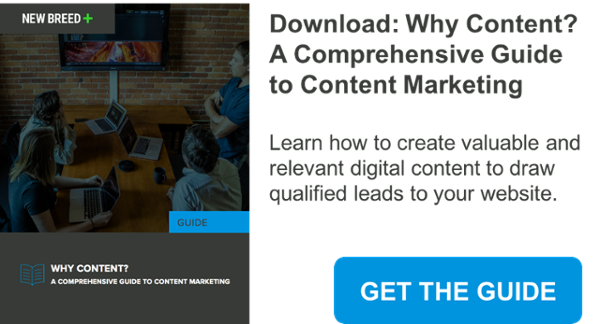Why You Should Implement a Content Audit

If you've been paying attention, then you already know: content is the bread and butter of inbound marketing. It's the vessel that carries leads from their first organic Google search to their name on the dotted line — and even after leads become customers, the content you offer continues to provide value.
Because it's such an integral part of your inbound marketing efforts — according to this 2016 Demand Gen Report, nearly half of buyers say they viewed three to five pieces of content before engaging with a sales representative — it's important that you keep track of which pieces of content you've created, the quality of that content and where it all resides. You can do this by implementing a content audit.
A content audit allows you to evaluate all of the content your organization has at its disposal, whether it's blog posts that live on your website, gated white papers or email templates tucked away on someone's personal computer. Whether you're kicking off your content strategy or re-evaluating your marketing efforts, a content audit is the perfect opportunity to organize, analyze and re-optimize the content you've created at every turn in your organization.
But if you're still on the fence, don't worry. To drive the value of this important practice, we've outlined these key reasons for implementing a content audit for your organization.
1. Know What You Have, Where It Lives and When to Use It
Content responsibilities shift so often within organizations; maybe you hire new content creators or your existing marketing manager decides to revamp their strategy. Unless you already have a strict content repository set up, or someone who's been in the organization forever is maintaining constant oversight, it's easy to lose track of what you have.
Therefore, the most obvious reason for conducting a content audit is to know what content is available to you, where to find that content when you need it and which personas and funnel stages it's applicable to. With a broad understanding of all of your assets, you can ensure you're squeezing the maximum value out of each piece of content you have.
You may find, for example, that you have a great white paper relevant to a specific persona, but it's not included in your website's resource directory. Or, there's an email template that would be useful to employees across departments, but nobody in the company knows about it. By compiling all of these lost-and-found assets into a centralized repository, categorizing them appropriately and ensuring all of the relevant people know they're available, you can quickly begin capitalizing on them.
2. Maintain Brand Consistency and Quality
Whether you're from a new start up company or a long-established enterprise, your brand is a precious and essential factor for driving credibility, improving customer experience and increasing loyalty. It's through the identity of your brand that prospects differentiate your company from competitors — it's how you build trusting, long-term relationships with them.
But because so many people may create so many different pieces of content for your company, it's difficult to guarantee that every piece of content is reflective of the brand, voice and quality that you want to put out into the world. By conducting a content audit, you can do a qualitative analysis of all of the blog posts, white papers, templates and other marketing materials you have and ensure quality and consistency across the board.
Later, you can use what you learned to create voice, tone and style guidelines for content creation moving forward. This will solidify the quality and integrity of your brand across all existing and future content, even as you hire new content creators, build out your website or scale your company.
3. Find Hidden Gems and Magnify Their Value
Here's our favorite part of implementing a content audit: those hidden gems. That webinar you forgot about. That old, outdated blog post that's been performing shockingly well. That email nurture stream you sent once and never thought about again.
As a company grows and the content piles up, it's easy to misplace or forget about individual pieces. With a content audit, you'll rediscover those hidden gems and have the opportunity to repurpose your inbound content in new campaigns — for maximum value with little effort. It helps you understand the performance of each piece and optimize your future strategy based on that information.
For example, you may dig up a high-performing webinar and realize that you don't have any other related content on your website. So, you can blow it out into a blog post, and then into a series of blog posts, and from that series you can create a premium content offer. This magnifies the content's value tenfold by pushing it out to more viewers and more locations, even if you're not technically offering any new ideas or information.
This works in the opposite direction as well. If a piece of content is performing poorly, but the topic is one you're sure your audience is interested in, then you can use that data to inform later decisions.
4. Enable Company-Wide Strategy and Scalability
Ultimately, anyone who is writing for your company, speaking about your product in public or involved with any of your sales and marketing efforts should have access to all distributable content. To ensure brand equity and consistency, everyone should be aligned with voice, tone and style, and everyone should be aware of how each piece of content might be valuable to prospects.
One of the greatest benefits of conducting a content audit is that you can organize this content for reuse among different departments. Once you've audited all of your content, updated it so it reflects your ideal brand identity and compiled it into an organized, centralized content repository, it can enable every member on your team to perform better and drive results. Even as your company continues to grow, the information you learn from a content audit will continue to complement your every effort.
Furthermore, if you need to gain buy-in from executives on certain marketing efforts, you can use the content audit to demonstrate what you've previously invested in marketing, how it's performing and what potential it already has. Rather than letting an asset rot in your flash drive, you can repurpose that content for further value and higher ROI.
Key Takeaways
In that same report we mentioned earlier, 65 percent of B2B buyers reported that the winning vendor's content had a "significant impact" on their buying decision. It's no question anymore: content is the fuel for your inbound marketing machine. Every piece of content you create has a purpose, and conducting a content audit will realign your team with that purpose — for higher quality, smarter strategy and better results.
Remember, there's no such thing as "good" or "bad" content, necessarily; content is either useful, optimized and consistent, or not. By implementing a content audit, you can leave out the guesswork and ensure that every piece of content churned out by your business is driving value at every turn.





